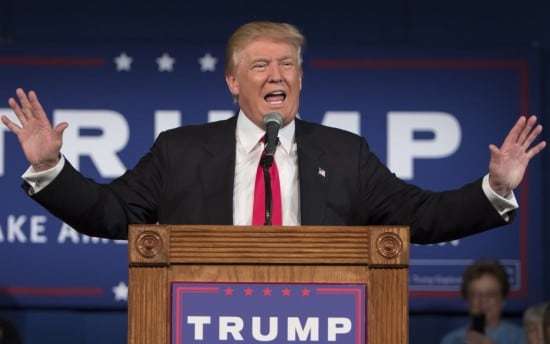The Volokh Conspiracy
Mostly law professors | Sometimes contrarian | Often libertarian | Always independent
Can Trump be trusted on judicial appointments?

Some conservatives and even a few libertarians continue to argue that judicial appointments may be a good reason to support Donald Trump, even as others remain skeptical. Back in May, Trump issued a fairly impressive list of possible Supreme Court nominees, which included a number of prominent originalist judges. The key question here is whether Trump can be trusted on this issue. The answer is no - for reasons that go beyond simple dishonesty.
The most obvious reason why Trump can't be trusted is that he has a long history of lying and deception. As Conor Friedersdorf recounts, Trump's first two wives, business partners, employees, and contractors all learned the painful lesson that Trump's word means nothing whenever it becomes convenient for him to break it. Traditional Republicans who care about the Court and originalism have no reason to expect better treatment at his hands. It's not as if they're a group he particularly likes, to put it mildly.
Friedersdorf also notes that Trump has already broken an important previous promise he made to Hugh Hewitt, one of the biggest champions of the idea that we should now trust Trump on the Court. Last year, he promised Hewitt that he would release his tax returns if he ran for president. That pretty obviously is not happening. Trump's promise to Hewitt about the Court should be viewed in the same light.
Trump himself has stated that the list is merely a "guide" and not binding. Even in his most recent comments to Hewitt, Trump avoided saying that he will actually stick to the list, but merely that he will appoint someone with "very similar principles" to those on the list. Trump's view of what qualifies as "very similar" could easily be different from Hewitt's or anyone else's.
Even if Trump is generally untrustworthy, some argue that he might keep his promises about the Court simply because he knows little about constitutional issues, and cares less. Since he supposedly has nothing to gain by breaking his word, he might as well keep it.
Trump is indeed profoundly ignorant about the Constitution. This is a man who thinks judges sign bills (they don't), and that the Constitution has an Article XII (it doesn't). But ignorance is not the same thing as indifference. Trump is not just a blank slate on constitutional issues. He has an agenda of his own.
He has a long history of seeking to undermine freedom of speech and constitutional property rights. He also seeks to gut constitutional constraints on executive power on a wide range of issues, doubling down on some of the worst precedents of the Bush and Obama administrations. And he admires the repressive practices of authoritarian regimes, such as the strognman tactics of Vladimir Putin and the Chinese government's Tiananmen Square massacre.
More generally, he seeks to transform the Republican Party into a European-style big-government nationalist party, such as the French National Front - a "workers party," he calls it. As prominent libertarian constitutional law scholar Randy Barnett puts it, "[i]f Trump takes over the Republican Party it's likely to become a right-wing nationalist party of the kind you see in Europe." Such a party would have little use for either originalism or constitutional limits on government power more generally, and would over time seek to appoint judges in line with its own authoritarian nationalist agenda. That sort of transformation of the GOP would be a far worse threat to constitutional originalism than a Hillary Clinton victory that results in one or two hostile Supreme Court appointments.
Unlike his list of possible nominees, Trump's authoritarian nationalist tendencies are not just recently adopted campaign tactics. Most of them are deeply held views that long predate the 2016 election. They are rooted in a zero-sum understanding of the world that has been at the heart of Trump's worldview for decades. With Trump, even more than most other candidates, longstanding commitments are a more compelling indicator of his true nature than short-term campaign ploys.
Moreover, if Trump wins, the GOP is likely to shift in the direction of his authoritarian nationalist platform for reasons that go beyond his personal proclivities. After all, such a triumph would lead many politicians and activists to conclude that Trump has found an effective formula for political success. And such success breeds imitation by other ambitious politicians. As a general rule, effective politicians and parties prioritize the pursuit of power over the defense of principle. Those who do not rarely get into power, or stay there for very long if they do.
Some may still hope that GOP senators will curb Trump's more dangerous instincts and force him to make good appointments. But there is little reason to expect Republican senators to rescue us on this issue. Few senators are profiles in courage, and it is rare for them to strongly oppose judicial nominees of a president of their own party.
It is still possible that Trump might appoint an originalist justice at some point, if it somehow might advance his short-term political interests. But, in the long run, his agenda is deeply inimical to originalism and constitutional limitations on government power. In sum, Trump can't be trusted on judges - and not just because he is generally untrustworthy. The problem is actually much worse than that.
There is a wide range of reasons to oppose Trump, and to conclude that even Hillary Clinton is a lesser evil by comparison. The issue of judicial appointments does not cut the other way. If you care about the long-run future of originalism and limited government, is is actually yet another reason to be #NeverTrump.


Show Comments (0)